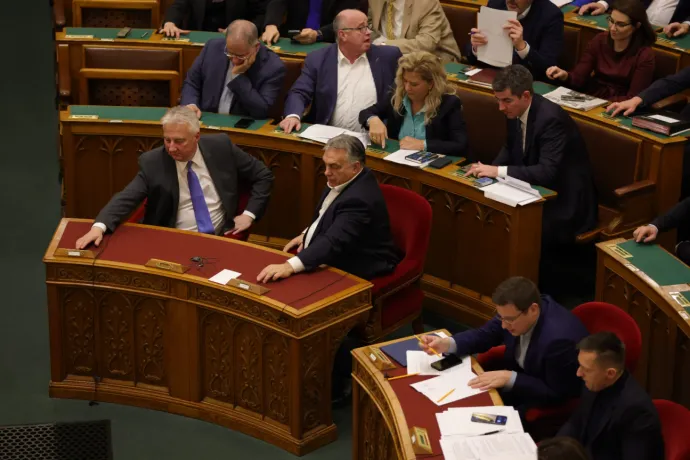Four months not enough for Hungary to ratify Swedish-Finnish NATO accession – while other laws pushed through in days or weeks

Four months were not enough for the Hungarian Parliament to vote on Sweden and Finland joining NATO, and Viktor Orbán announced that it will for sure not happen this year. On the other hand, the last few years have shown that if the government really wants to, it can push proposals through parliament within just a few days or at the most, weeks. It took a mere two days in July to pass the tax law reform, ten days to raise PM Orbán's salary, and barely a few weeks to pass the pedophile law averted into an anti LGBTQ law. It also took parliament just a few weeks to pass a law which made it possible to transfer public funds to foundations. This is a summary of how long passing certain proposals into law had taken the Hungarian National Assembly in the past.
Hungary supports the accession of Finland and Sweden to NATO, but the vote on this issue will only take place at the first meeting of Parliament next year, Viktor Orbán announced at a press conference after the V4 summit in Kassa last Thursday. So despite the Polish prime minister having urged Hungary to quickly ratify the two countries' accession to NATO, Orbán did not give in – adding that, in his opinion, the two countries had not lost a minute because of Hungary.
It's been months since Foreign Minister Péter Szijjártó submitted the bills on the Finnish and Swedish applications for joining NATO to Parliament in July, but the issue still hasn’t been put on the agenda.
The Hungarian government has previously repeatedly said that there was a "good chance" that they would vote on the issue in this year's session, and in September, Parliament confirmed to Telex in writing that this would be done during the autumn session.
When we asked the government again in November, the State Secretary for Foreign Affairs replied that the ball was in Parliament's court, the government had done its job, and it couldn't rush the National Assembly, which has "very important issues" on its table all autumn. As Levente Magyar told us, "the House has been working at full steam all autumn".
But then, four months after the proposal was tabled, Orbán publicly announced that the issue would be postponed until next year. The majority of the 30 member states of the military alliance ratified the two countries' applications for membership in July and August, leaving only Turkey and Hungary without ratification. Minister Gergely Gulyás has claimed that this is not being used to put pressure on the European Commission over the 3,000 billion forints being withheld from Hungary.
The government and the National Assembly do not always sit on a proposal for so long. It has become clear in recent years that if the Hungarian government wants to pass a law, it can get it through parliament rather quickly.
Some things only took days or weeks
The tax law reform, for example, was pushed through Parliament in less than two days this July. The proposal was tabled on Monday, debated for a few hours on Tuesday under a special procedure and voted on the very same day. Although Katalin Novák "sensed" the outrage of society, she was unaffected by the intense protests and bridge-blockade: as President of the Republic, she signed the law a few days later. In this way, the government effectively executed the simplified small business tax known as "KATA". Due to the changes, of the previously 400 000 entrepreneurs who paid their taxes this way, from September, more than 300 000 were forced to either switch to another tax bracket or give up their jobs entirely.
It took just three weeks to pass the pedophile law averted into an anti-LGBTQ law. Máté Kocsis submitted the proposal on pedophiles at the end of May 2021. In June, however, a few new sections were added to it, for example, prohibiting the promotion and presentation of homosexuality and gender reassignment to persons under the age of eighteen.
Five days later – despite thousands of people protesting – the governing majority, together with Jobbik, voted in favor of the law, which European Commission President Ursula von der Leyen called a disgrace and 15 EU countries condemned in a joint statement. János Áder, who was President at the time, found nothing wrong with it and signed it quickly.
This subject was later followed up by pushing the so-called "Child protection referendum" through the National Assembly " – which included questions such as "Do you support the promotion of sex reassignment treatments to underage children?" Viktor Orbán announced the referendum in July 2021, right after the Pegasus spy software scandal broke, which had Hungarian implications as well. Then came a summer break, and Parliament passed it in November. This was necessary, the government said, because "Brussels had clearly attacked Hungary in the weeks before over the child protection law".

And as to what these attacks were…For example, the European Commission did not approve the Hungarian recovery plan, the rule of law report was published, and it included serious criticism: corrupt elites, worrying legislation procedures and media situation. It was also announced that the EU would start infringement proceedings against Hungary for violating the fundamental rights of gays and lesbians.
Then in June this year, at a rapid pace, just ten days after the bill was tabled, Parliament urgently voted to almost double Viktor Orbán's salary. Until then, the prime minister was one of the lowest-paid members of the government, and his asset declaration showed no savings. As Prime Minister, he had been receiving a gross salary of 1.5 million forints (3700 euros) which was increased to 3.5 million forints gross. On top of this, he receives a basic monthly salary of 1.3 million forints gross as an MP. This change brought his total income from 2.8 million forints (6900 euros) to 4.8 million (11800 euros).
How public funds were transferred to foundations
Parliament also only needed a few weeks to make the transfer of public funds into foundations possible. The law, which was adopted last April, placed 70 percent of Hungarian higher education institutions under a foundation, and the state gave away thousands of billions of forints' worth of public property to these organisations without any compensation. The foundations are run by appointees delegated by Fidesz. A trust equipped with hundreds of billions of forints in assets was also established.
The essence of the foundation setup is that the public assets that the government gives to these foundations are no longer considered public funds in the classic sense, and most of the rules governing the operation of these foundations can only be changed by a two-thirds majority. Fidesz Vice President Lajos Kósa explained the whole point in a very clear way:
“It is all very simple. I am a private person, my money is mine. This is true until the moment I put it in the foundation. From then on I have no right to it, no connection to it, no interest in that money. I am cut off from it. That is the essence of a foundation. That money ceases to be mine. The point of the foundation is that I put the money in, and from then on, the previous ownership of that money ceases completely. In the same way it's public money until the founder has put the money in the foundation, and from then on it's the money of the foundation and not public funds.”
But the National Assembly also passed the amendment to the Social Law very quickly, within barely a month. According to this law the state would only help the needy as a last resort, once the family and the local government had already failed to do so; lex CEU, which made the operation of the Central European University in Budapest impossible, was decided on just as quickly. The same is true for the overtime law, which allows the employer to increase the number of overtime hours from 250 to 300 a year, or even 400, by collective agreement. It took barely two months to pass the law that made sex change impossible, just as it took only a few weeks to pass the amendments which changed terms county and government commissioner into archaic terms reminiscent of times when Hungary was a kingdom.
Solid as granite – but not quite
Hungary's new Fundamental Law was adopted by Parliament in 2011. Its text was written by József Szájer, former Fidesz MEP and Minister Gergely Gulyás. On the occasion, Orbán said that the Fundamental Law was "as solid as granite". It has proven so solid that it has already been amended eleven times since then, usually a month after an amendment was tabled. This happened three times recently.
Most recently in July this year, the Parliament voted to amend it, in this case, to make it possible to hold the EP and local elections on the same day. According to Fidesz this will save 9-10 billion forints.
Just two months earlier, in May, the Fundamental Law was amended for the tenth time, to include a state of danger due to war. Orbán explained this by saying that there is a war going on next to Hungary, a war "which no one can see the end of yet", and that this is why he believes it must be ensured that the government has room for maneuver and the ability to act immediately.
The state of danger is about governing by decree, it gives the government the power to override existing laws. The government has for example, used the state of danger due to war as an excuse to issue a decree stating that public spaces can be used free of charge for the fireworks display on 20 August, which was postponed for a week and finally held on 27 August.
The Fundamental Law was amended for the ninth time in December 2021. It was then that the definition of public funds was changed and the phrase "the mother is a woman, the father is a man" was added. Katalin Novák, who was Minister for Family Affairs at the time, explained that the Fundamental Law had to be amended again due to the Covid-19 pandemic.
For more quick, accurate, and impartial news from and about Hungary, subscribe to the Telex English newsletter! It's free, and only takes a few seconds to sign up for!